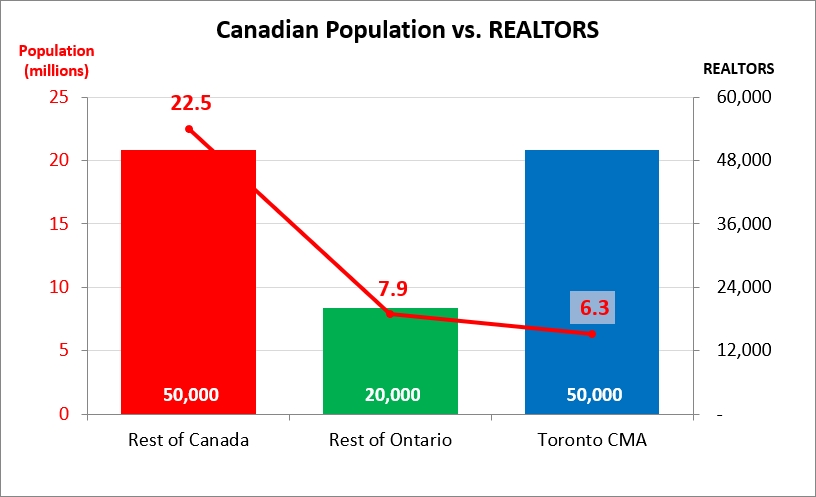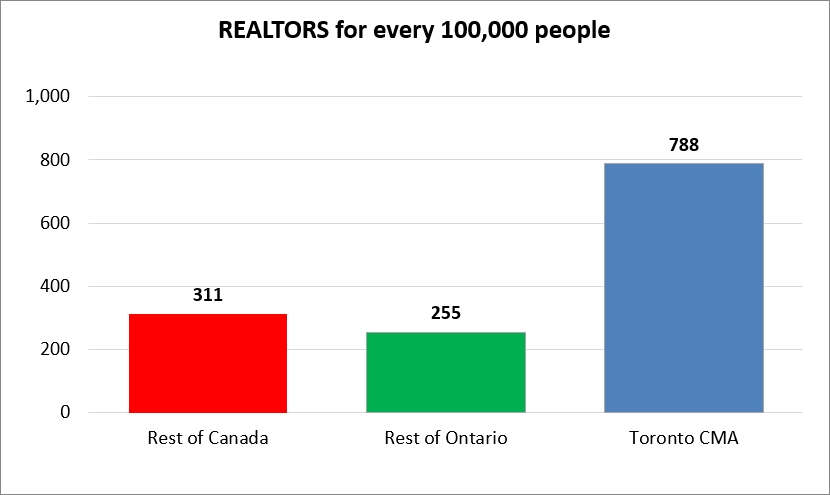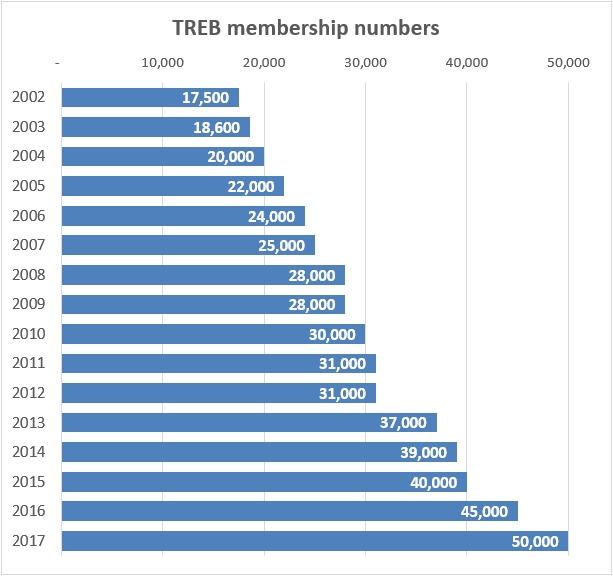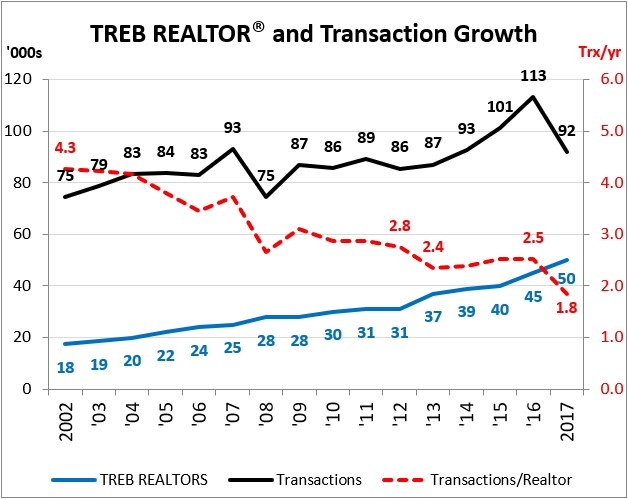*MILESTONE ALERT* Based on the latest TREB membership numbers, we have now surpassed 50,000 REALTORS® working with the Toronto Real Estate Board (TREB). There are only 50,000 Realtors working outside of Ontario in the other 9 provinces and territories put together!
The July 1 population of Canada in 2017 was 36.7 million people¹. Currently roaming among us in this fine country are 120,000 Realtors (per Canadian Real Estate Association). The Ontario Real Estate Association (OREA) claims 70,000 members, hence the 50,000 outside of Ontario number. Anyway, 120,000 sounds a lot of agents/brokers. Going by that per capita rate, you would expect the Toronto Census Metropolitan Area (CMA) with its population of 6.342 million¹ would have about 20,700 Realtors. But the current 50,000 Realtors working with the Toronto Real Estate Board (TREB) means the Toronto CMA has 17% of Canada's population but 41% of the Realtors.
That's some heavy saturation!
Toronto vs. Everybody
Here's the amount of TREB Realtors compared to the rest of the country:
Source: CREA, OREA, TREB, Statistics Canada
If it isn't clear, the red line goes with the left axis and shows the breakdown of the 36.7 million Canadians. The bars go with the right axis and show the breakdown of the 120,000 Canadian Realtors.
Using the population splits from above, and expressed another way, you can really see the concentration in the TREB territory, where there are 2.5 times the national average (outside of Ontario) per capita and 3.1 times more than the rest of Ontario. When I last looked at these numbers in September of 2016, the Toronto number was 734 per 100,000 and it was 2.3 times the national average.
Source: CREA, OREA, TREB, Statistics Canada
Newcomers still flocking to TREB
So the TREB numbers are still climbing. Below shows how many "New Members" have joined TREB each month since July 2016 (the start of TREB's fiscal year). It has averaged 388 a month, or nearly 100 a week.
Source: TREB as of Dec 13, 2017 (last updated Nov 2, 2017)
But interestingly, when I compare the July to October period (first 4 months of TREB's fiscal year) for 2017 versus 2016 , the number of bandwagon jumpers New Members is down 28% YoY. OREA raised the bar for entry slightly by requiring you take 5 courses before you get your license (followed by one in the next two years) as opposed to 3 (followed by three in the next two years). But I'm guessing the slowdown in New Members has to do more with the slowdown in GTA sales (October YTD transactions are down 19.3%).
The most recent TREB membership numbers show 49,651 at the end of October 2017. They haven't posted November stats but if I add the 388 monthly average of new members, that takes me to 50,039 hence the 50,000 I'm working with for this post. [Update: when November finally got posted it was 50,106.] Here's how that's grown over time:
Source: 2002 - 2016 TREB press releases from as close to July 1 as I could find; 2017 from TREB membership numbers page
The fifteen year growth rate is 7.2% annually. If that doesn't sound like a lot, it means it doubles every 10 years. The population certainly hasn't done that (though prices have). It's pretty nuts to me that TREB has gained 10,000 members in the past two years, an 11.4% annual rate of increase. It took 7 years to grow by 10,000 from 2002 to 2009
Less to go around
When people hear about Toronto's RECORD SALES years and CLIMBING PRICES, many figure Realtors are living large. Certainly, top selling agents are definitely rolling in it given today's prices. But even the big transaction growth in the last couple of years are no match for the number of agents hopping aboard. In my November market charts post I projected 91.8K transactions for 2017. I know that's down a lot from last year's record of 113.1K, but it's still the 5th highest transaction year ever.
Over the 16 years shown below, transaction growth has been 2.0% per year (based on a 3 year moving average), but the growth in the number of agents has been 7.2% per year. So with agents growing faster than transactions, there are going to be less transactions for the average agent. Hence, the red line below has declined from 4.3 transactions annually back in 2002, to only 1.8 transactions this year.
Source: TREB, with 2017 transaction projection by Scott Ingram
If I use the 3 year moving average for agents and transactions it works out to 2.3. But each transaction has two sides: buy and a sell. So you can double the number above and the average agent would be involved in a transaction 4.6 times a year, or one every 79 days. Did that saturation lead to less realtor activity than you would have guessed?
Notes
I have no statistics on how many of these are part-time and how many are full-time. It would be great to have separate stats for that, and you'd think it wouldn't be so hard to track if TREB (and other boards) wanted. But I spoke to a former TREB President and they said that if they publish stats like that it suggests there's a difference between a full-time and a part-time agent. And they don't want to upset all of those "side hustle" dues-paying agents. I fully believe there is a difference between FT and PT. I mean real estate is hardly brain surgery, but would you want your brain surgeon to be performing surgeries constantly, or just doing one or two a year on family and friends?
1 - 2017 figure, per Statistics Canada
2 - 2016 figure of 6,242,300 per Statistics Canada with conservative 100,000 added on for growth (average growth from 2011 to 2016 was 131,847)
3 - 2017 numbers are extrapolated from TREB October 2017 YTD data compared to October 2016 YTD data and multiplied by 2015 year-end transaction numbers
About Scott Ingram CPA, CA, MBA
Would you like to make better-informed real estate decisions? I believe knowledge is power. For that reason I invest a lot of time researching and analyzing data and trends in the Toronto real estate market. My Chartered Accountant (CPA, CA) side also compels me to perform a lot more due diligence on properties my clients are interested in purchasing. If you have better information, you should have less risk and be in a position to make better decisions for your hundreds of thousands of dollars.
Your home is the single largest investment you'll make - trust it with an accountant.









Post a comment